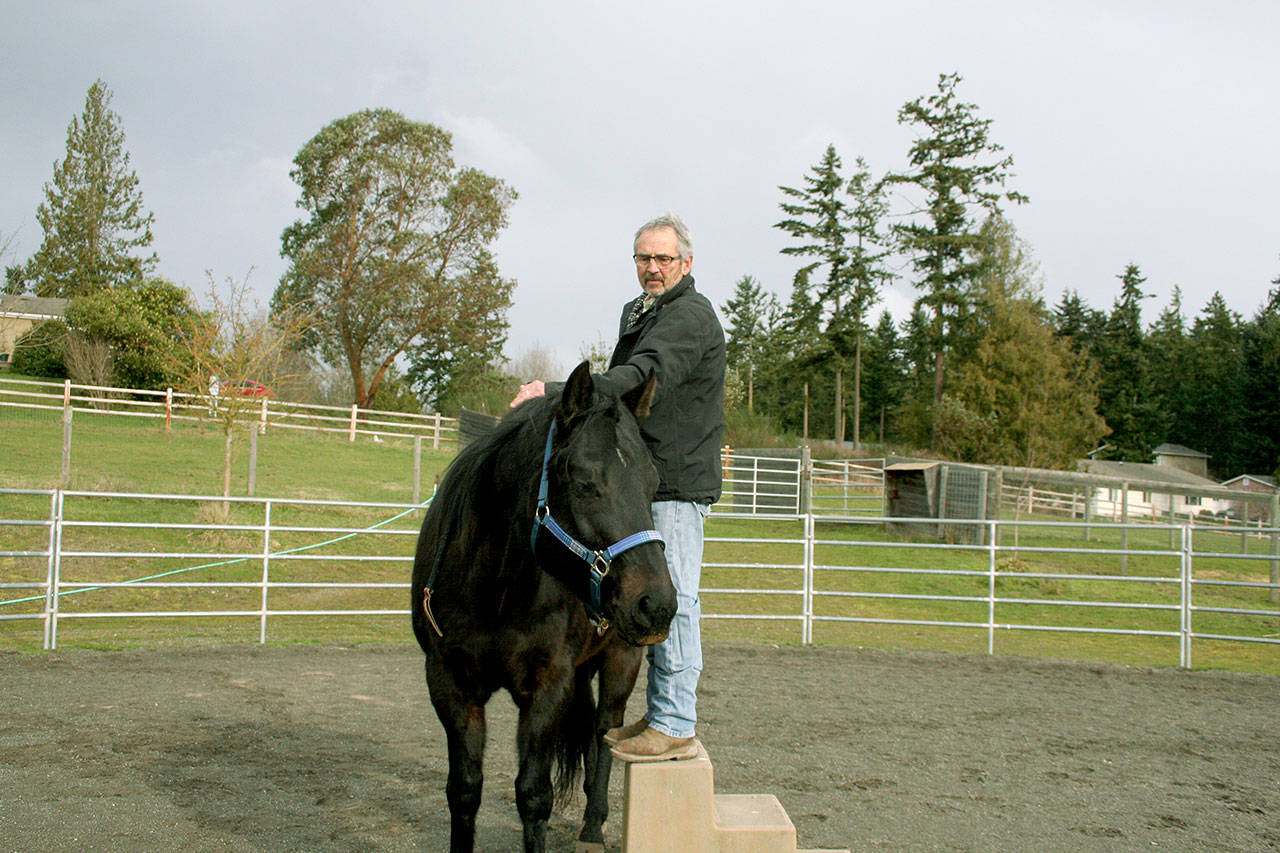HORSE TRAINERS NEED to become the center of the universe — and respected by — the horses they train. Ken Seifer strives to become that center through his patient and firm demeanor, combined with using calm, consistent and clear communication skills. In horse herds, there’s a hierarchy. Seifer has learned to build on that instinct.
“When I come and stand in front of the horse, I expect him to treat me like I’m somebody,” said Seifer, 70. “I have to drive the bus, to be the one they look to as their leader. But I’m not a bully; I know that can take time. I want to treat these horses more like they’re really good employees with all the benefits, but they earn those benefits.”
Much of his work is accomplished during ground work in a round pen before he steps into the saddle.
While talking, we discovered both our eyes were opened to a better way of working, communicating and bonding with our horses after reading Monty Roberts’ books and watching some of his videos when he become well-known in the early years of this century.
I first heard of Seifer in the early 2000s when he was helping a few Sequim residents — including Juanita Ramsey Jevne and Virginia O’Neil whom I had met through Jevne’s Five Acre School — with their Icelandic horses.
Thereafter, I thought of him every time I passed his little yellow farmhouse and training facility off Old Olympic Highway in Sequim. It was about 30 years ago when he arrived in Sequim from Ohio and started working for Joan Windser, training her gaited horses at her WW Ranch on Vaultier Road, later becoming her stallion manager. By the time she sold her place, he had a good reputation and his own clientele.
Seifer doesn’t focus on any particular style of riding, be it English, Western or gaming; it’s up to his clients to pursue what interests them. Since a lot of problem horses are sent his way, it’s become an utmost importance to him to create a safe working environment for both horse and owner. He insists owners become active participants in the process; otherwise, after training is completed and the horse returns home, the horse’s issues often return because the owner hasn’t learned the tools to handle them.
“It’s so easy to get really hurt around horses,” he said. “That’s why we need to be aware of being safe. To be realistic about the type of horse and the skills we have. To not get a horse that’s too much for the rider to handle safely.”
Once a horse is traumatized, just like people who’ve been traumatized, the fear or issues never fully go away, but with the right help, a person can find the tools and other ways to work past the problem.
“My big thing is language and understanding the language. Horses can’t read our minds, even though some people think they can, but they can definitely read intention, body language and mood,” he said.
He likened problem horses to “foster kids who’ve been passed around from owner to owner and from home to home.”
With my own horses, I’ve discovered it takes about two years for each horse to feel settled before they truly trust me and we become good partners. Seifer said even the ones that haven’t been passed around can still develop all sorts of behavioral issues.
“When people come to me, I evaluate the horse, listen to the owner, and then we address those issues. So we get to the root, work on that, and then everything else falls into place.”
As he and his wife, Karen, neared retirement age, they decided to slow their lives down, so they sold their farm and moved to Port Townsend. Now, Seifer trains at a private barn off South Jacob Miller Road owned by Bonnie Ludlow. He still takes on clients but no longer takes on horses that need hours of training that require his behind in the saddle.
“I’ve no desire to spend hours a day in the saddle now because now it hurts,” he said, partly in jest.
If a horse does require hours of training in the saddle, he recommends they ask Jessica Crouch, a trainer at Freedom Farm in Agnew.
A horse will always read the person riding or handling them and test that person no matter what. The horse knows when a person is scared, timid, overconfident, an idiot — or someone to fear — and their skill level.
“So from the beginning,” he said, “I work with the horses and their owners to learn what they are supposed to be doing and why, in order in be successful and safe.”
I asked if he’s ever recommended a client sell a horse because it will never be a safe horse for that owner or family.
“Oh yes, because there’s so much fantasy surrounding horses and horse ownership,” he said. “Fantasy of what this horse means to me, so I have to work it out. Or wondered how could the horse do this to me — like kick or buck off — when I love you so much, and I’ve done so much for you?’”
He said people need to get past wishful thinking and fantasies because it’s not healthy thinking for the owner or the horse.
“Reality is better when you get the right horse for you, along with bettering your own horsemanship skills,” he said. “And it’s a much more fun and enriching experience.”
For more information, phone Seifer at 360-775-1865.
________
Karen Griffiths’ column, Peninsula Horseplay, appears the second and fourth Sunday of each month.
If you have a horse event, clinic or seminar you would like listed, please email Griffiths at kbg@olympus.net at least two weeks in advance. You can also call her at 360-460-6299.

